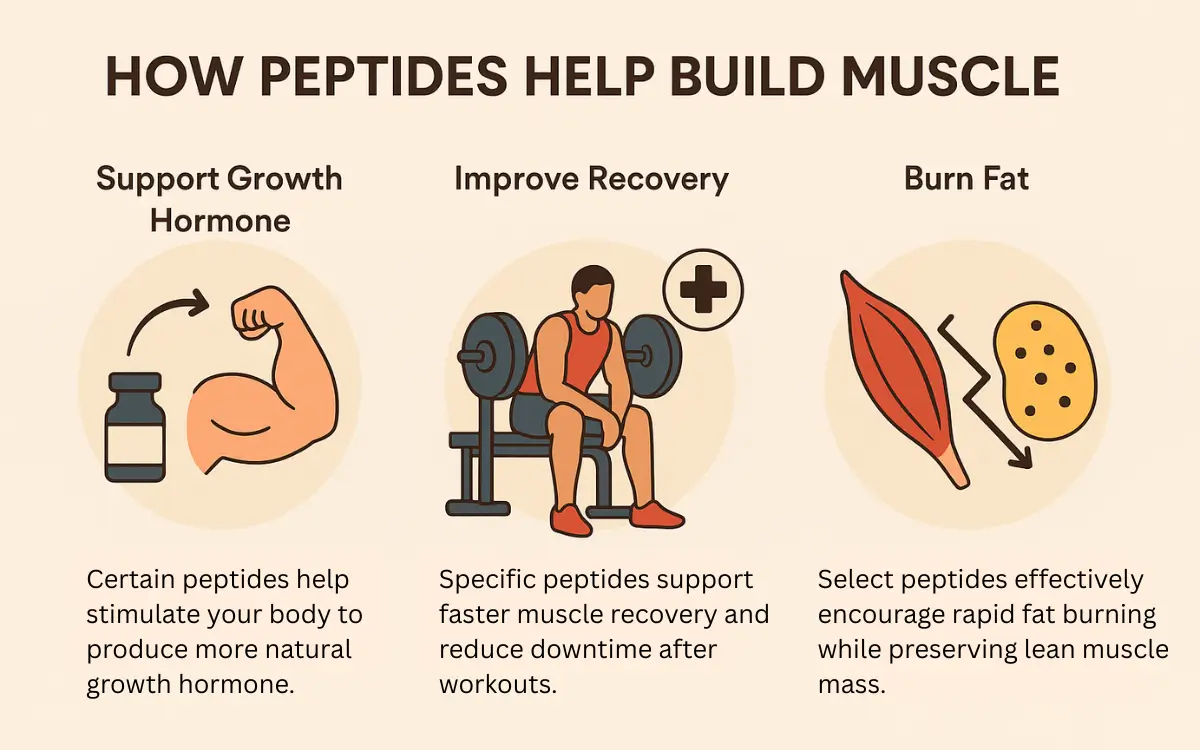Optimize Your Exercise Outcomes: The Role of Peptides for Building Muscular Tissue Clarified
Peptides have actually arised as a substantial consider optimizing workout outcomes. These brief chains of amino acids are recognized to affect muscular tissue development and recovery. By promoting the launch of growth hormonal agents, peptides can enhance healthy protein synthesis. This process is crucial for developing and fixing muscle fibers after extensive training. Nonetheless, the specifics of how to effectively incorporate peptides right into a physical fitness routine remain much less understood. What are the implications for athletes and health and fitness lovers?
Comprehending Peptides: What They Are and Just how They Work
Peptides are short chains of amino acids that play a necessary duty in numerous organic features, including bodybuilding. Comprised of two or more amino acids connected by peptide bonds, these particles work as signaling agents in the body. They can influence various physiological procedures such as hormonal agent metabolic process, cells, and launch fixing. Peptides can be normally taking place or manufactured and are often categorized based on their feature, such as development aspects or hormone precursors.
In the context of muscle mass growth, particular peptides advertise protein synthesis and support healing after intense exercise (buy Peptides for Building Muscle). They work by improving the body's natural devices, activating anabolic processes that result in muscle development. Additionally, peptides may help in weight loss and boost overall physical performance. Comprehending the features and prospective advantages of peptides can offer useful insights for professional athletes and fitness lovers intending to enhance their training programs and achieve far better outcomes
The Science Behind Muscle Development and Recuperation
Muscle mass growth and recovery are essentially driven by muscle mass healthy protein synthesis, a process that repairs and constructs muscle mass fibers after physical exertion. Recognizing the devices behind healing and fixing is important for optimizing training end results. This procedure not only boosts muscle mass toughness however additionally supports general athletic performance.
Muscular Tissue Protein Synthesis

Recuperation and Fixing Processes
Recuperation and repair service processes are important components of muscle development, as they enable the body to heal and reinforce after intense exercise. During workout, micro-tears take place in muscle mass fibers, which activate a complex biological reaction. The body utilizes different peptides, such as IGF-1 and BPC-157, to enhance healing by promoting cell regeneration and reducing swelling. These peptides stimulate the launch of growth hormonal agents, promoting muscle mass repair and adjustment. Ample nourishment and hydration additional support these procedures, making certain that the body has the required foundation for recovery. Inevitably, reliable recovery not just enhances muscle mass development however additionally prepares the body for subsequent exercises, maximizing general efficiency and results in the long-term.
Trick Benefits of Peptides for Muscular Tissue Building
Peptides have become an effective tool in the domain name of fitness, especially for those looking for to boost muscle growth and efficiency. These brief chains of amino acids play a vital role in boosting healthy protein synthesis, which is important for muscle mass repair work and development. By promoting the release of development hormonal agents, peptides can raise muscle mass while at the same time lowering body fat, leading to a more toned body.
Additionally, peptides may enhance recuperation times, allowing people to educate harder and much more often without the normal exhaustion related to exhausting workouts. This increased recuperation promotes regular progress and enhanced overall performance. On top of that, peptides can enhance endurance and endurance, enabling professional athletes to press their limitations during training sessions. Ultimately, the incorporation of peptides right into a physical fitness regimen can yield considerable benefits, making them an attractive alternative for those dedicated to enhancing their muscle-building efforts.
Kinds of Peptides Made Use Of in Physical Fitness and Bodybuilding
While various peptides offer distinct features, a number of have obtained certain popularity in the physical fitness and muscle building neighborhoods for their muscle-building residential properties. Amongst these, Development Hormone-Releasing Peptides (GHRPs) are significant for boosting the launch of development hormonal agent, which assists in muscular tissue development and fat loss. One more popular group is Insulin-like Growth Variable 1 (IGF-1), which promotes muscle cell development and healing.
Additionally, Collagen peptides are significantly used for boosting joint health and wellness, a necessary aspect for bodybuilders engaged in extreme training. Peptides like BPC-157 have likewise amassed interest for their possibility in healing injuries and improving recuperation times.
Lastly, CJC-1295, a growth hormone secretagogue, is preferred for its capacity to increase muscle mass while improving rest and recovery. These peptides represent just a couple of alternatives offered to health and fitness enthusiasts aiming to optimize their outcomes and efficiency.
Just How to Incorporate Peptides Into Your Workout Program
Including peptides right into a workout regimen requires cautious consideration of several vital elements. Picking the ideal peptides, timing the dosages efficiently, and keeping an eye on progression are essential steps for making best use of benefits. By approaching these elements thoughtfully, individuals can boost their muscle-building initiatives.
Picking the Right Peptides
Picking the ideal peptides can significantly improve an individual's workout routine, as these compounds play an important function in muscular tissue growth and healing. To pick the right peptides, one have to initially determine certain physical fitness goals, such as enhanced muscle mass, improved endurance, or faster healing times. Popular peptides like GHRP-6 and Ipamorelin are known for their ability to stimulate development hormonal agent release, while others like BPC-157 focus on recovery and recuperation.
Individuals need to also consider their experience degree and any type of hidden wellness problems before incorporating peptides. Consulting with a medical care specialist or a knowledgeable trainer can give useful insights. Inevitably, the right peptides must align with individual health and fitness goals and support overall health and wellness and health.
Timing Your Doses
Timing plays an essential function in making the most of the benefits of peptide supplementation for muscle growth and recovery. To accomplish perfect results, individuals should take into consideration carrying out peptides near their workout schedule. Several experts recommend taking peptides about 30 Check This Out minutes prior to exercise, as this can improve efficiency and promote muscle synthesis during training. Post-workout administration is likewise vital, generally within an hour after exercise, to facilitate recuperation and muscular tissue repair service. In addition, consistency in timing helps maintain steady degrees of peptides in the body, further supporting muscle mass growth. Staying with a regular dosing routine permits much better assimilation into a workout program, making sure that the body fully profits from the anabolic results of the peptides.
Keeping Track Of Progression Effectively

Security and Side Impacts of Peptide Usage
While peptides are usually promoted for their muscle-building benefits, it is necessary to take into account their security and potential adverse effects. Customers may experience a variety of negative impacts, consisting of injection website reactions, migraines, and intestinal disruptions. A lot more severe issues involve the risk of hormone inequalities and modifications in metabolic rate, which can bring about lasting health problems. Furthermore, the uncontrolled nature of several peptide products questions regarding their purity and credibility, boosting the threat of contamination or incorrect dosages.
It is also important to keep in mind that the long-term results of peptide usage continue to be largely unidentified, as lots of studies have been carried out only in short-term situations. People taking into consideration peptides for muscular tissue improvement must consult medical care specialists to evaluate the benefits against the potential threats, making sure a risk-free and educated technique to their physical fitness objectives.
Real-Life Success Stories: Peptides at work
Various athletes and physical fitness enthusiasts have actually reported exceptional changes through making use of peptides in their training regimens. These substances have actually been attributed with boosting muscle mass growth, boosting recovery times, and boosting overall athletic efficiency. For instance, an expert body builder shared that integrating peptides led to an obvious increase in muscle mass within a couple of weeks, allowing him to lift larger weights and achieve his competitors objectives.
Similarly, a competitive jogger kept in mind that peptides significantly lowered her recovery time, enabling her to educate tougher and more often without injury. One more individual, a leisure gym-goer, applauded peptides for their function in fat loss while maintaining lean muscle, achieving a body he had actually long wanted. These endorsements highlight the capacity of peptides as a game-changer in physical fitness, highlighting their efficiency in different athletic searches and highlighting the expanding passion in peptide therapy amongst those seeking to maximize their workout outcomes.
Frequently Asked Inquiries
Can Peptides Be Made Use Of for Fat Loss as Well?
Peptides can indeed be used for weight loss. Research suggests that specific peptides might enhance metabolic rate, promote lipolysis, and aid in body make-up changes, making them a potential tool for people aiming to reduce body fat.
Are Peptides Lawful to Make Use Of in Sports Competitions?
Peptides are usually banned in sports competitions, as they fall under the classification of performance-enhancing compounds. Athletes should consult relevant regulations to assure conformity and prevent prospective incompetency or fines connected with their usage.
For how long Does It Take to See Outcomes From Peptides?
Results from peptides can generally be observed within 4 to 6 try this site weeks, depending upon elements such as individual physiology, dose, and the certain peptide utilized. Consistency in training and nutrition additionally considerably influences outcomes.
Do Peptides Call For a Prescription for Acquisition?
Peptides frequently require a prescription for lawful purchase, as they are categorized as abused substances in several areas. Availability can differ based on location and certain peptide type, requiring consultation with a healthcare service provider.
Can Peptides Interact With Various Other Supplements or Medications?
Peptides can engage with numerous supplements and drugs, potentially improving or decreasing their impacts. It is essential for individuals to speak with health care specialists prior to incorporating peptides with various other substances to assure safety and effectiveness.
These peptides promote the release of growth hormones, assisting in muscular tissue fixing and adjustment. Amongst these, Development Hormone-Releasing Peptides (GHRPs) are significant for boosting the launch of development hormonal agent, which assists in muscle mass development and fat loss. Choosing the proper peptides can substantially enhance an individual's exercise routine, as these substances play a crucial function in muscle development and recovery. Timing plays an important duty in optimizing the benefits of peptide supplementation for muscular tissue development and recuperation. Outcomes from peptides can normally be observed within 4 to six weeks, depending on anchor elements such as private physiology, dosage, and the specific peptide used.